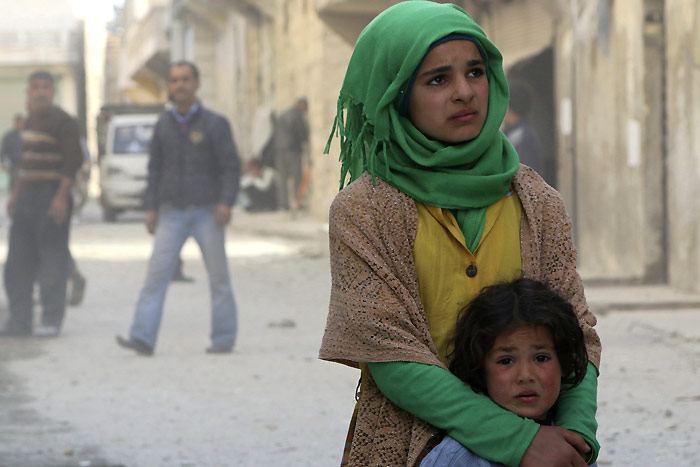Syria: More access to victims needed
13-03-2014 Operational Update
Three years since the Syria conflict began, the humanitarian situation for millions of people across the country is catastrophic and only getting worse. Amid spiralling violence and fragile local ceasefire agreements, the International Committee of the Red Cross (ICRC) is pushing for greater access to people in need and to be allowed to work neutrally, impartially and independently.

6 March 2014. Girls stand as they look at a site hit by a bomb in Aleppo's al-Sakhour district. ©Reuters / Hosam Katan
“Working closely with the Syrian Arab Red Crescent (SARC), we delivered essential aid to hundreds of thousands of people in February. However, this is not enough given the scale of the crisis in Syria today,” said Boris Michel, head of the ICRC delegation in Damascus. “Relief is not reaching people in dire need often because we are not granted access to them. Essential goods are running critically short for millions; particularly those people trapped in besieged areas and cut off from essential health services.”
Violence continued across the country over the last month, notably in and around the northern city of Aleppo, where hostilities resulted in mass displacement and many civilian casualties. "The ability of the ICRC to conduct humanitarian activities in the area has been extremely limited due to poor security and lack of authorizations," says Mr. Michel. "The ICRC has also repeatedly requested safe access to acutely vulnerable people in Yarmouk, Moaddamiyah, Eastern Ghouta and other besieged areas."
Critical situation in Aleppo
Hostilities reached alarming levels in eastern Aleppo in February, with civilian neighbourhoods often directly targeted. The ICRC calls for a firm commitment by all parties to respect the basic principles of international humanitarian law and to facilitate its humanitarian work.
Throughout the month, bombardments and explosions forced tens of thousands of civilians to flee towards the western part of the city and Rural Aleppo, often at great risk. Few collective shelters were available, placing an additional burden on families hosting displaced relatives and friends.
The ICRC continues to work with local water boards in Aleppo to provide clean water to over 1.5 million people in and around the city, while helping the local SARC branch distribute emergency relief items.
Emergency aid in Barzeh
During a ceasefire in late February between Syrian authorities and opposition groups in Barzeh District, northwest of Damascus, the ICRC and the SARC distributed essential relief, including medical supplies, to 20,000 people and a civilian medical facility.
"We were able to bring aid into Barzeh and this is a positive development. Provided we can properly assess the humanitarian situation and deliver aid impartially, ceasefires are an opportunity to reach those in need," added Mr Michel.
For further information, please contact:
Ralph El Hage, ICRC Damascus, tel: ++963 930 336 718
Ewan Watson, ICRC Geneva, tel: +41 22 730 33 45 or +41 79 244 64 70
